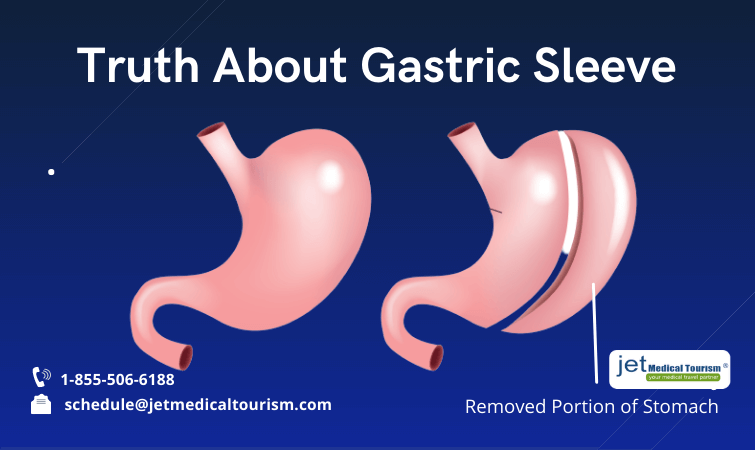Truth About Gastric Sleeve Revealed

People who struggle with obesity often have questions or concerns about the gastric sleeve, which is the most widely chosen weight loss surgery today. Is gastric sleeve safe? Is it reversible? Some questions are more pragmatic, such as: does insurance cover gastric sleeve? While people who are more worried about their food habits even ask: can you drink fizzy drinks or chew gum after gastric sleeve? In this post, let us try to unravel the mystery and find out the real truth about gastric sleeve.
Contact Jet Medical Tourism® today.
What is the truth about gastric sleeve surgery?
Undergoing a bariatric surgery is a life-altering decision. Clearly, you should have access to the most authentic information about the surgery before you go ahead with it. The biggest truth about gastric sleeve surgery is that the medical community worldwide now accepts it as the most effective way to eliminate obesity.
VSG’s high weight loss success rate, reduction of co-morbidities, and low complication risks make it an excellent treatment option. However, this surgery is not a miracle solution, and it is not for everyone. To understand the truth about gastric sleeve, it’s first important to debunk the common myths surrounding this surgery.
Myth # 1: Gastric sleeve is the easy way out
The truth about gastric sleeve is that it should be the last option when non-invasive weight loss approaches have failed to work. Can gastric sleeve be reversed? The answer is no. Therefore, think twice before you choose it.
Myth # 2: Insurance will always pay for it
The harsh truth about gastric sleeve for many patients is that they may not be eligible for coverage, even if they have a health plan. Does insurance cover gastric sleeve? The answer is it depends. So, talk to your insurer first.
Myth # 3: Gastric sleeve will instantly eliminate obesity
A critical truth about gastric sleeve is that it does not directly produce weight loss, but enables you to gradually lose weight through diet and exercise. Can you gain weight after gastric sleeve? Yes, if you disregard diet.
Myth # 4: Gastric sleeve is risky for patients with obesity
The truth is that obesity itself is the biggest health risk for a patient. Gastric sleeve surgery will vastly cut down that risk and reduce co-morbidities too. Is gastric sleeve safe? Yes, if you work with a qualified bariatric surgeon.
Myth # 5: There is no solution if gastric sleeve surgery fails
While weight loss failure after gastric sleeve is rare, it is not the end of the road. Can you have gastric sleeve surgery twice? The answer is yes! If your sleeve re-stretches later on, it may be possible to have a repeat surgery.
RELATED: Gastric sleeve failure
Gastric sleeve facts
Now that we have debunked some of the common myths, it is time to focus on the facts. The best way to learn the truth about gastric sleeve is to consult with a trusted bariatric surgeon. Be prepared to ask questions, check patient testimonials and success stories, and review gastric sleeve before and after photos to see things from the perspective of actual patients.
Here are 10 notable facts about gastric sleeve surgery.
- Gastric sleeve is primarily performed as a laparoscopic procedure, which makes it less invasive
- Gastric sleeve reduces stomach size by about 80%, but no changes to the intestine are involved
- As a restrictive surgery, it reduces the capacity to eat and store food in the stomach
- VSG suppresses appetite by reducing the production of hunger hormone ghrelin in the body
- You can lose up to 80% of your excess weight in the first year itself after this surgery
- Obesity-related medical conditions, such as hypertension, diabetes, or sleep apnea may be resolved or reduced
- Most adults with a BMI of 35 or above with co-morbidities or 40 or above without co-morbidities are eligible for this surgery
- Recovery is fast, complication risks are low, and scarring is minimal after a sleeve gastrectomy
- The truth about gastric sleeve surgery is that your weight loss success is contingent upon your dietary discipline
- Gastric sleeve not only improves health, longevity, and appearance, but also provides emotional and psychological benefits
Is gastric sleeve safe?
Any surgery involves some degree of risk, but surgery is the greatest advancement of medical science, which saves lives. Therefore, when you ask the question is gastric sleeve safe, the answer is “yes” as long as the health benefits significantly outweigh the risks.
Here are a few salient points that will help you judge the truth about gastric sleeve safety.
- Least invasive: Among all the mainstream weight loss surgery procedures, gastric sleeve is the least invasive. It can be performed laparoscopically using only small incisions. It does not involve rerouting of the intestines, and simply involves the surgical removal of a part of the stomach tissue.
- Low complications: Research shows that a standard gastric sleeve surgery is safe with no risk of mortality and an extremely low risk of leakage (1.2%). Long-term risks typically seen with more complex weight loss surgeries, such as bowel obstruction and hernia are avoid in case of gastric sleeve.
- Surgeon’s skills: A truth about gastric sleeve or any other surgery, which should be obvious but still often gets ignored, is that your procedure is only as safe as your surgeon’s skills. Make sure you work with a highly qualified and experienced bariatric surgeon with a demonstrable success and safety record.
- Personal commitment: How diligently you abide by your surgeon’s post-op recovery and care instructions, and how well you follow your gastric sleeve diet plan will make a vital difference to your safety. Complications such as dumping syndrome and acid reflux can be avoided with a disciplined diet and lifestyle.
CHECK THIS: Is gastric sleeve safe?
Is gastric sleeve reversible?
A vital truth about gastric sleeve that you must know at the very outset is that the surgery is irreversible. At your initial consultation, you should ask your bariatric surgeon can gastric sleeve be reversed. A dedicated surgeon will explain to you the reasons why this surgery cannot be reversed, and help you make a carefully considered decision about it.
Why is gastric sleeve not reversible?
The primary goal in a gastric sleeve surgery is to reduce your stomach volume. Your surgeon will surgically remove about 75 to 70% of the original stomach tissue, leaving behind a small sleeve-shaped pouch. Once this tissue has been removed, there is no way to restore it back. In that sense, a gastric sleeve surgery is a lifetime commitment to your good health.
Is a gastric sleeve permanent?
Many patients want to know that if gastric sleeve cannot be reversed, does it mean that the surgery is permanent. Yes, it is permanent in the sense that the stomach tissue once removed cannot be replaced. However, if you fail to follow your post-op dietary guidelines, the new stomach sleeve may re-stretch. So, the gains made with the surgery can be reversed in these cases.
COMPLETE DETAILS: Is gastric sleeve reversible?
Does insurance cover gastric sleeve?

If you are operating on a limited budget, one of the legitimate questions to ask is: does insurance cover gastric sleeve? In general, the answer is yes, insurance covers gastric sleeve surgery in the US, Canada and some other countries. However, you should keep the following issues in mind to know the actual truth about gastric sleeve insurance coverage.
- Strict eligibility: Insurance companies impose stringent eligibility conditions, even if you have a valid coverage. For example, if your BMI is even marginally below 40, or you cannot prove that your non-invasive weight loss efforts failed, you may be denied coverage.
- Long waiting: Obesity is a widespread problem in most countries. Chances are that there would be a long waiting list of patients who are seeking gastric sleeve just like you through the insurance company. If you have an urgent need for this surgery, an excessive delay may not be a good idea.
- Out of pocket costs: Even if you have insurance coverage, you may still have to pay for deductibles and co-pays from your own pocket. Moreover, some of the pre- and post-operative costs may not be covered under your plan. So, do your cost-benefit analysis when you consider insurance coverage.
READ THIS: How to get weight loss surgery approved?
Can gastric sleeve be repeated?
Some patients may want to know can you have gastric sleeve surgery twice. The answer is yes, it may be possible to repeat this surgery in certain circumstances. An experienced bariatric surgeon will carefully determine your candidacy for a revision or repeat procedure, and help you achieve your weight loss goals in the best possible way.
How can gastric sleeve be repeated?
If you have regained weight after gastric sleeve, your surgeon will perform diagnostic tests to find out if your stomach tissue has re-stretched. If this is the case, they may recommend a gastric sleeve repeat surgery, which is clinically called a re-sleeve gastrectomy. In this procedure, the surgeon will again remove a part of your stomach tissue to create a small gastric pouch.
Why does the sleeve re-stretch in some cases?
If the stomach sleeve re-stretches, it will defeat the purpose of your surgery. This may occur due to two possible reasons. One possibility is that you have been eating more food than prescribed, which forces the tissue to stretch again. The second possibility is that during your primary gastric sleeve, the surgeon failed to remove sufficient amount of stomach tissue.
Can you get pregnant after gastric sleeve?

Many women want to know can you get pregnant after gastric sleeve surgery. The answer is yes, you can have one or more pregnancies after gastric sleeve. In fact, this procedure is likely to improve your fertility and increase your chances of getting pregnant. However, you should know some of the pregnancy-related truths about gastric sleeve as follows.
- One year gap: While pregnancy after gastric sleeve is safe, you should plan it only when your recovery is complete and the body weight is no longer fluctuating. This could be at least one year from the date of your surgery.
- Prepare for c-sec: A cesarean delivery may be more likely after you have had a gastric sleeve surgery. Bring up this issue with your ob-gyn and if required, request them to talk to your weight loss surgeon who performed your VSG.
- Prioritize health: Pregnancy will take a physical toll on your body, but do not make it an emotional battle to preserve your cosmetic appearance over your health. Focus on your nutrition and fitness for a safe and healthy pregnancy.
What percentage of gastric sleeve regain weight?
One of the basic questions to address is can u gain weight after gastric sleeve? Well, yes! It is possible gain weight after gastric sleeve for a number of reasons. But it is more important to know what percentage of gastric sleeve patients will regain weight after the surgery. Here is the truth about gastric sleeve surgery when it comes to post-op weight regain.
- Weight regain at 1 year: In the first year, most of the patients are focused on their gastric sleeve diet plan and are likely to achieve dramatic results. The incidence of weight regain at the end of first year is usually negligible, unless a patient develops health issues and is unable to follow up with the prescribed diet plan.
- Weight regain at 2 years: One research study has shown that only about 5.7% of the patients may gain weight following gastric sleeve surgery at two years. Researchers recommend a revision weight loss surgery for these patients who are unable to achieve their goals, and are likely to benefit from a repeat surgery.
- Weight regain over time: Individual results will vary over the long run regarding what percentage of gastric sleeve regain weight. Non-compliance of the patients with their post-op diet and exercise guidelines is the leading cause of weight regain. In a few cases, surgery-related causes may be responsible for weight gain.
READ THIS: Why am I not losing weight after gastric sleeve surgery?
Why can’t you eat and drink after gastric sleeve?
Many people have a misconception that a gastric sleeve surgery will impose severe restrictions for a lifetime on what to eat and drink. The truth about gastric sleeve is that you are required to follow a balanced and nutritious diet. That’s all. When you consume in moderation, there is no reason why can’t you eat and drink after gastric sleeve.
Can you drink fizzy drinks after gastric sleeve?
While you should minimize the intake of carbonated, caffeinated, sugary, and alcoholic drinks after gastric sleeve, you can occasionally enjoy them. Restrictions will apply in the first few weeks and months, but over time you can take more liberties with your diet plan – as long as you do not violate the broad guidelines of your surgeon.
Can you chew gum after gastric sleeve surgery?
Chewing gum is one of the few food items that should be entirely avoided after a gastric sleeve surgery. Even if you choose a sugar-free gum just to keep your mind off grazing and snacking, the act of constant chewing without eating will let air escape into your GI tract. You might experience gastric discomfort if you make a habit out of chewing gum post-surgery.
Can I take tums after gastric sleeve?
Tums are antacid agents designed to neutralize or counteract the effects of acidity and gas in the stomach (tummy). Some patients may experience occasional acid reflux and general gastric discomfort as a side effect of their gastric sleeve surgery. Therefore, one of the common questions doctors get from their patients is: can I take tums after gastric sleeve surgery?
The answer is that tums should ideally be avoided as far as possible. Do not get into the habit of eating hard-to-digest foods and then using tums to obtain relief from acidity. However, in exceptional situations, when you are experiencing mild acid reflux symptoms, you might take tums to restore your digestive comfort. If the symptoms are severe or persistent, consult your surgeon.
YOU MIGHT ALSO LIKE: Gastric sleeve diet: An ultimate guide on VSG diet
Do you lose hair after gastric sleeve?

During your pre-op consultation, you may want to ask your bariatric surgeon: do you lose hair after gastric sleeve? The truth about gastric sleeve is that certain temporary side effects might occur, especially in the first few weeks or months. Hair loss or hair thinning is one of them. This happens because you have significant dietary restrictions in the early recovery stage.
Here are few tips to minimize temporary hair loss after gastric sleeve.
- Eat more of lean proteins, which are the building blocks for cellular regeneration and hair follicles.
- Add iron and vitamin C supplements with the advice of your surgeon to support natural hair growth.
- Eat fish, flaxseeds and green veggies, which contain fatty acids to promote thicker hair.
- Include vitamin B-complex (biotin) and zinc to your nutrition supplements, which can reduce hair loss.
- Follow a nutrient-packed diet, stay well-hydrated, and keep yourself stress-free for healthy hair development.
Does gastric sleeve weaken immune system?
Considering the prevalence of disease-causing bacteria and viruses in the environment, maintaining a strong immunity is vital to fight the risk of infections. Therefore, do not hesitate to ask your weight loss surgeon: does gastric sleeve weaken immune system? The answer is not too clear because the research is still controversial about whether bariatric surgery procedures affect immunity.
The good news is that gastric sleeve surgery is known to help in disease resolution or remission of various obesity-related co-morbidities. As your body recovers from these conditions, the immune system is only likely to receive a boost. Moreover, an increased focus on a balanced diet, regular exercise, and nutrition supplements may only further help to fortify your immune system in the long run.
How long is the stomach swollen after gastric sleeve?
During a sleeve gastrectomy, your surgeon will use a laparoscope and tiny surgical instruments to remove a substantial part of your stomach tissue. Thereafter, they will suture the remaining portion to create a small banana-shaped sleeve. Some amount of swelling will develop post-surgery, which will gradually resolve on its own.
Here are a few insights on how long is stomach swollen after gastric sleeve:
- More pronounced swelling in the stomach will resolve within a week, as the incisions in your stomach begin to heal.
- Minor swelling in the stomach may linger on for about 5 to 7 weeks until the staple line heals.
- You can apply ice packs in the incision sites around your navel area in the first 48 to 72 hours to improve swelling.
- As you begin mild physical exercises from the third or fourth week, the firmness in the stomach will quickly relax.
- You can resume your normal routine from the second week and wear a long top to cover your stomach if want to conceal the swelling.
READ THIS TOO: 5-Day pouch reset
Does anyone regret gastric sleeve surgery?
The truth about gastric sleeve is that not everyone is going to be happy after it. Although an overwhelming number of patients are likely to experience transformative results and dramatically improve their health and quality of life, some may be less satisfied. If you ask a dedicated surgeon does anyone regret gastric sleeve surgery, they will give you an honest answer: yes!
- Choosing a less qualified or less experienced surgeon is the foremost cause of patients regretting gastric sleeve surgery.
- Failure to follow the surgeon’s guidelines regarding post-op diet and fitness may cause you to regret gastric sleeve.
- Serious complications are rare with gastric sleeve surgery, but if they do occur, you might feel regretful of your decision.
- Poor financing planning, choosing an expensive hospital and ending up in a debt trap is another reason for gastric sleeve regret.
- Challenges in marital life, if your spouse is unable to accept your newfound self-esteem, may result in regret after gastric sleeve.
RELATED: Gastric sleeve regrets
Does the gastric sleeve cause cancer?
Cancer is a life-threatening disease. You certainly wouldn’t want to choose a surgery that saves you from obesity but gives you cancer. To know the truth about gastric sleeve, be prepared to ask your surgeon in utmost seriousness: does the gastric sleeve cause cancer? Here’s what medical research say on this issue.
Gastric sleeve reduces the risk of cancer
According to researchers, obesity is the second major preventable cause of cancer after smoking. Obesity is responsible for two out of every five cancers diagnosed in the US. Clearly, when you get rid of obesity with the help of gastric sleeve surgery, you are going to significantly cut down your risk of cancer. From this perspective, does the gastric sleeve cause cancer? No! On the contrary, it saves you from potential risk of cancer.
VSG may increase the risk of colorectal cancer
The International Journal of Cancer published a research study, which showed that patients who have undergone weight loss surgery may be at a higher risk of colorectal cancer (CRC). While gastric sleeve was not the specific focus of this study, it is worth considering the results of this study. However, on the flip side, you should also know that obesity is well-known risk factor for CRC, which means gastric sleeve would cut down this risk.
RELATED: US study shows bariatric surgery may reduce breast cancer risk
Need more information on gastric sleeve surgery? Contact Us!
When you are fighting a long and hard battle against obesity, you might be receiving all sorts of tips from your well-wishers. The Internet itself is a vast source of information about obesity and its solutions. However, the key is to receive professional, dependable advice that you can put into action.
To know the real truth about gastric sleeve, and to make a wise choice, ask to speak with a bariatric surgeon at Jet Medical Tourism® today. Our knowledgeable and caring team is here to help you. We will arrange your virtual consultation with one of our top-rated gastric sleeve surgeons. Call now!


